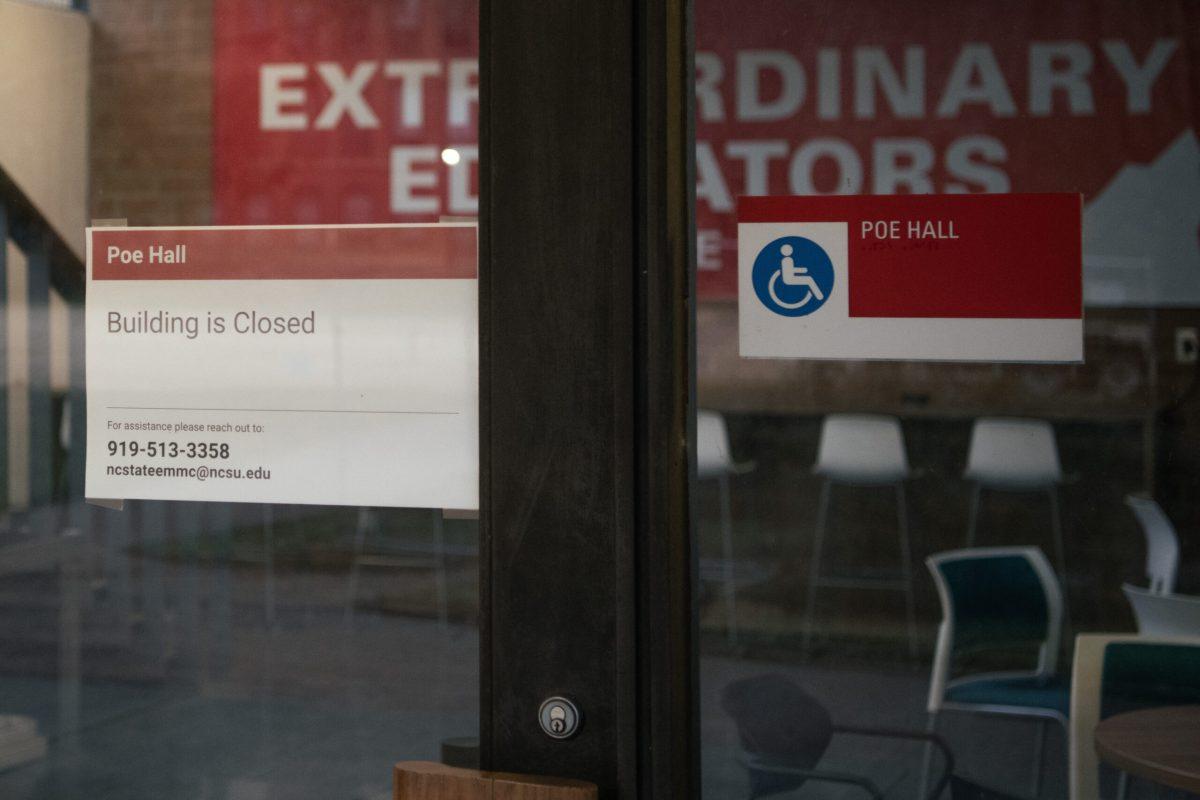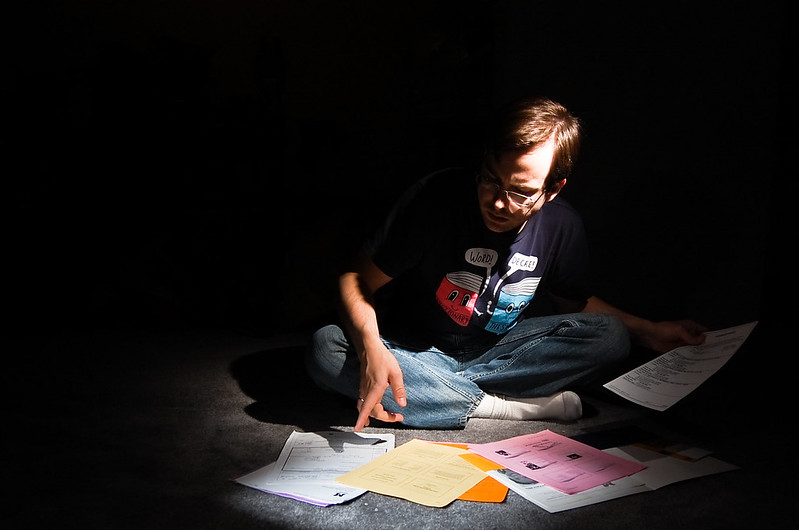Photo by Jeremy Byrne | Staff Photographer
A sign on the doors marks the continued closure of Poe Hall on Wednesday, Jan. 24, 2024. Poe Hall was closed in November 2023 due to the presence of environmental contaminants (PCBs).
NC State University initiated the closure of Poe Hall, home to the College of Education and the Department of Psychology, in November of 2023, due to test results indicating that the building contained toxic chemicals. It has remained closed since then, and here’s everything we know so far.
Tests were conducted in August of 2023 due to “a concern raised [in August] about indoor air quality resulting from an ongoing renovation project,” according to a statement released by Provost Warwick Arden and Vice Chancellor Charles Maimone on the university’s news website. It is unclear when exactly in August this concern was raised and who raised it. The following month, the North Carolina Department of Labor (NCDOL) sent a letter to NC State saying that the state Occupational Safety and Health Division “received a complaint concerning alleged health and/or safety hazards” at Poe Hall.
The complaint form attached to the letter said that the employees hadn’t been informed of the presence of the harmful chemicals within the building despite ongoing renovations and asbestos remediation being conducted. The complaint also raised concerns about lead-based paints and PCBs within Poe Hall.
PCBs–also known as polychlorinated biphenyls–are highly carcinogenic chemical compounds that were banned from being produced in the United States in 1978. Before their ban, they were most commonly used in consumer products and commercial building materials. Poe Hall was built in 1971.
Test results revealed the presence of PCBs in five rooms in Poe Hall, including the women’s bathrooms, faculty offices and a computing center. PCBs were found in levels up to 38 times higher than EPA standards for building materials. So far, over 100 people who’ve spent time inside of Poe Hall have come forward with a cancer diagnosis.
Several NC State employees have written to the University and the North Carolina Department of Health and Human services, urging them to further investigate the cancer clusters and any other serious illnesses that could be connected to Poe Hall. However, both institutions have declined, instead focusing on performing an environmental study of the building.
“To better understand any issues present in Poe Hall, the university is working with Geosyntec Consultants, a consulting firm with expertise in environmental building assessment in the public and private sectors. Geosyntec can also provide toxicology expertise, and has been asked to conduct a more detailed analysis of potential human health effects associated with exposure,” as said on the NC State official website. Testing was anticipated to begin in December.
Lawyers representing NC State met with staff of the National Institute for Occupational Safety & Health (NIOSH), in which the lawyers explained its retention of Geosyntec to conduct an environmental investigation of Poe Hall. While it isn’t clear when NIOSH opened a Health Hazard Evaluation (HHE) at Poe Hall, the agency closed the initial evaluation at some point following the meeting. NC State requested to pause the HHE while Geosyntec conducted its testing, according to CDC spokesperson Lisa George.
On Feb. 5, 2024, WRAL reported that the CDC told them that NC State’s general counsel retracted the HHE request in January 2024. Soon after this, NC State lawyers contacted NIOSH asking them to retract this claim, saying that the University “did not withdraw the request for the HHE or ask that any HHE be closed.” The University formally requested NIOSH open a new HHE, and the evaluation was reopened due to mutual agreement between NIOSH and NC State.
Controversy surrounding the contamination of PCBs arose, specifically pertaining to the alleged lack of communication of said contamination between Chancellor Randy Woodson and the NC State community. College professor Stephen Porter called for a vote of no confidence in Woodson and Arden, citing 10 complaints regarding how the university handled the situation. A vote of no confidence is a formal declaration by a body of people to determine if an executive is fit to continue holding their position. The faculty in the College of Education passed these votes after an emergency meeting was called. The vote against Woodson was the first in NC State’s history. Though this vote does not have the power to remove Woodson and Arden from leadership, it’s a symbolic vote that represents the NC State’ community’s desire for leadership to improve things moving forward.
In response to this, the Chancellor released a video statement on Feb. 27 on the university’s “Poe Hall Updates” page, saying that his team was “exploring ways to improve our lines of communication.” He also addressed the more than 100 people who’ve spent time in Poe Hall and have been diagnosed with cancer.
“To those of you who have health concerns, please know that we hear you, and we see you, and I’m committed to keeping you informed of our progress,” he said. “It’s a challenge to express empathy through a website, statements, question and answers sessions — but please know we care very much about you. It’s what motivates us in this work.”
The next phase for testing in Poe Hall is set to begin in March, which could reportedly take months according to Chancellor Woodson. “This timing allows work currently underway in the building to be completed before we turn on the heating, air and ventilation system for the next phase of testing. As shared previously, this work takes time. This next phase of testing, analysis and reporting could take months.”
Due to this timeframe, it is anticipated that Poe Hall will remain closed through at least Dec. 31, 2024, and Chancellor Woodson has reassured that campus leadership is “committed to transparency in this process,” and will continue to regularly update the community on the progress being made.
It is unclear whether or not the university will test other buildings on campus for PCBs and other potentially hazardous materials. Some have raised concerns about this because many of NC State’s buildings were built before PCB production was federally banned in the United States. Campus leadership has not made it evident that this will occur, and seem to be solely focused on Poe Hall until further notice.






